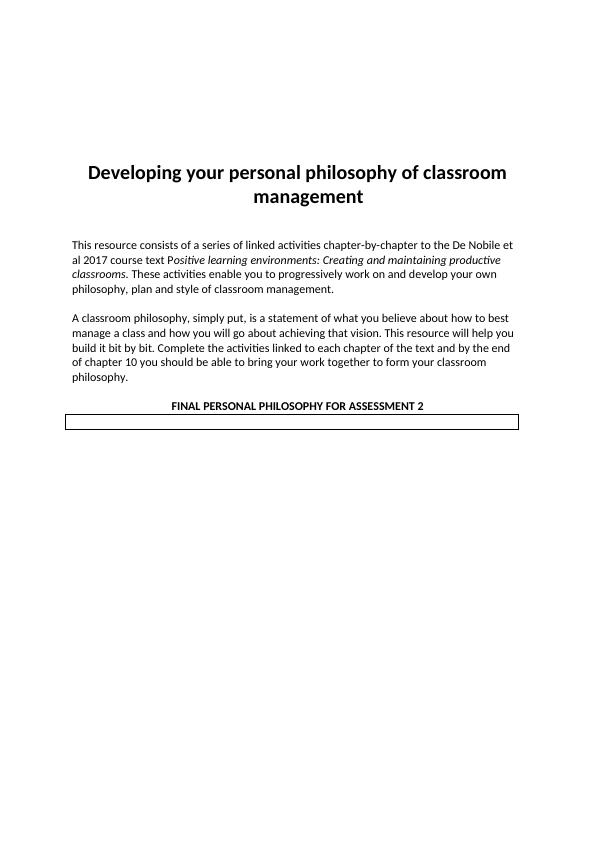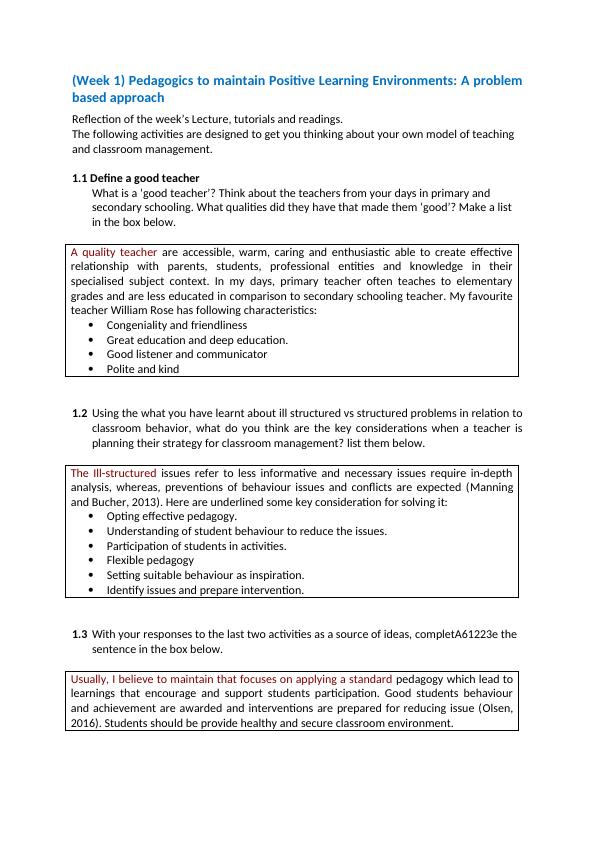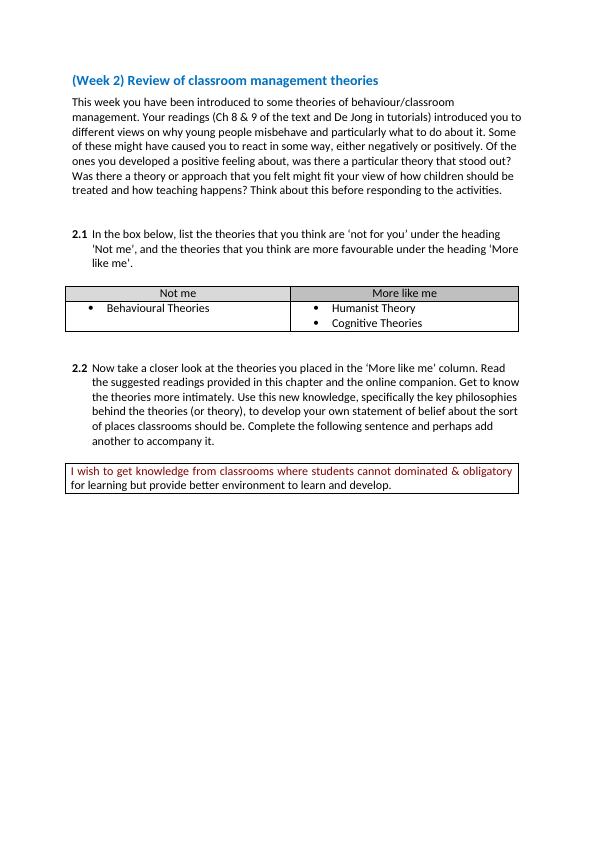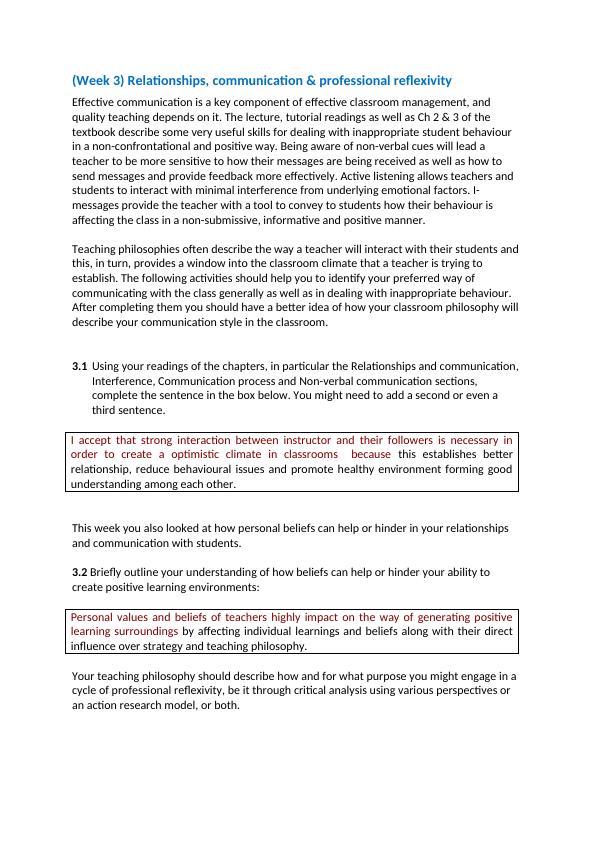Ask a question from expert
Developing a Personal Philosophy of Classroom Management
14 Pages4171 Words462 Views
Added on 2020-11-12
Developing a Personal Philosophy of Classroom Management
Added on 2020-11-12
BookmarkShareRelated Documents
Developing your personal philosophy of classroommanagementThis resource consists of a series of linked activities chapter-by-chapter to the De Nobile et al 2017 course text Positive learning environments: Creating and maintaining productive classrooms. These activities enable you to progressively work on and develop your own philosophy, plan and style of classroom management. A classroom philosophy, simply put, is a statement of what you believe about how to best manage a class and how you will go about achieving that vision. This resource will help you build it bit by bit. Complete the activities linked to each chapter of the text and by the end of chapter 10 you should be able to bring your work together to form your classroom philosophy. FINAL PERSONAL PHILOSOPHY FOR ASSESSMENT 2

(Week 1) Pedagogics to maintain Positive Learning Environments: A problembased approachReflection of the week’s Lecture, tutorials and readings.The following activities are designed to get you thinking about your own model of teaching and classroom management.1.1 Define a good teacher What is a ‘good teacher’? Think about the teachers from your days in primary and secondary schooling. What qualities did they have that made them ‘good’? Make a list in the box below.A quality teacher are accessible, warm, caring and enthusiastic able to create effectiverelationship with parents, students, professional entities and knowledge in theirspecialised subject context. In my days, primary teacher often teaches to elementarygrades and are less educated in comparison to secondary schooling teacher. My favouriteteacher William Rose has following characteristics: Congeniality and friendlinessGreat education and deep education.Good listener and communicator Polite and kind1.2Using the what you have learnt about ill structured vs structured problems in relation toclassroom behavior, what do you think are the key considerations when a teacher isplanning their strategy for classroom management? list them below.The Ill-structured issues refer to less informative and necessary issues require in-depthanalysis, whereas, preventions of behaviour issues and conflicts are expected (Manningand Bucher, 2013). Here are underlined some key consideration for solving it: Opting effective pedagogy. Understanding of student behaviour to reduce the issues. Participation of students in activities. Flexible pedagogySetting suitable behaviour as inspiration.Identify issues and prepare intervention. 1.3With your responses to the last two activities as a source of ideas, completA61223e the sentence in the box below.Usually, I believe to maintain that focuses on applying a standard pedagogy which lead tolearnings that encourage and support students participation. Good students behaviourand achievement are awarded and interventions are prepared for reducing issue (Olsen,2016). Students should be provide healthy and secure classroom environment.

(Week 2) Review of classroom management theories This week you have been introduced to some theories of behaviour/classroom management. Your readings (Ch 8 & 9 of the text and De Jong in tutorials) introduced you todifferent views on why young people misbehave and particularly what to do about it. Some of these might have caused you to react in some way, either negatively or positively. Of the ones you developed a positive feeling about, was there a particular theory that stood out? Was there a theory or approach that you felt might fit your view of how children should be treated and how teaching happens? Think about this before responding to the activities.2.1In the box below, list the theories that you think are ‘not for you’ under the heading ‘Not me’, and the theories that you think are more favourable under the heading ‘More like me’.Not meMore like meBehavioural TheoriesHumanist TheoryCognitive Theories2.2Now take a closer look at the theories you placed in the ‘More like me’ column. Read the suggested readings provided in this chapter and the online companion. Get to know the theories more intimately. Use this new knowledge, specifically the key philosophies behind the theories (or theory), to develop your own statement of belief about the sort of places classrooms should be. Complete the following sentence and perhaps add another to accompany it.I wish to get knowledge from classrooms where students cannot dominated & obligatoryfor learning but provide better environment to learn and develop.

(Week 3) Relationships, communication & professional reflexivity Effective communication is a key component of effective classroom management, and quality teaching depends on it. The lecture, tutorial readings as well as Ch 2 & 3 of the textbook describe some very useful skills for dealing with inappropriate student behaviour in a non-confrontational and positive way. Being aware of non-verbal cues will lead a teacher to be more sensitive to how their messages are being received as well as how to send messages and provide feedback more effectively. Active listening allows teachers and students to interact with minimal interference from underlying emotional factors. I-messages provide the teacher with a tool to convey to students how their behaviour is affecting the class in a non-submissive, informative and positive manner. Teaching philosophies often describe the way a teacher will interact with their students and this, in turn, provides a window into the classroom climate that a teacher is trying to establish. The following activities should help you to identify your preferred way of communicating with the class generally as well as in dealing with inappropriate behaviour. After completing them you should have a better idea of how your classroom philosophy will describe your communication style in the classroom.3.1Using your readings of the chapters, in particular the Relationships and communication, Interference, Communication process and Non-verbal communication sections, complete the sentence in the box below. You might need to add a second or even a third sentence.I accept that strong interaction between instructor and their followers is necessary inorder to create a optimistic climate in classrooms because this establishes betterrelationship, reduce behavioural issues and promote healthy environment forming goodunderstanding among each other. This week you also looked at how personal beliefs can help or hinder in your relationships and communication with students. 3.2 Briefly outline your understanding of how beliefs can help or hinder your ability to create positive learning environments:Personal values and beliefs of teachers highly impact on the way of generating positivelearning surroundings by affecting individual learnings and beliefs along with their directinfluence over strategy and teaching philosophy. Your teaching philosophy should describe how and for what purpose you might engage in a cycle of professional reflexivity, be it through critical analysis using various perspectives or an action research model, or both.

End of preview
Want to access all the pages? Upload your documents or become a member.
Related Documents
Developing Your Personal Philosophy of Classroom Managementlg...
|16
|4211
|423
Pedagogy, Assessment and Contesting Curriculumlg...
|9
|2459
|407
Assignment on Researching And Developinglg...
|12
|2718
|16
Teaching Communication Language and Literacylg...
|7
|2254
|16
Teaching Philosophy and Resumelg...
|10
|2089
|59
Teaching Professional PORTFOLIO TABLE OF CONTENTSlg...
|10
|1952
|156